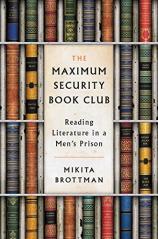The Maximum Security Book Club: Reading Literature in a Men's Prison
Review
The Maximum Security Book Club: Reading Literature in a Men's Prison
Mikita Brottman, a professor of humanities at Maryland College Institute of Art in Baltimore, selected pieces of fiction for her newly formed book club at Jessup Correctional Institution, 45 minutes from her home. In THE MAXIMUM SECURITY BOOK CLUB, she shows us the progress that both she and her nine (plus) convicted felons made over their discussions during the almost three years they met.
Brottman deliberately chose 10 works that “deal with outsiders, who strike out against society,” including HEART OF DARKNESS, BARTLEBY, THE SCRIVENER: A Story of Wall-Street, JUNKIE, THE STRANGE CASE OF DR. JEKYLL AND MR. HYDE, MACBETH and LOLITA. The novels and stories do not shy away from showing the “human struggle, man’s isolation, and the uncertainty and pain of conflict.” Brottman's careful and smart reading of each of the men during the discussions shows her growing awareness that they are articulate, insightful, intelligent readers. Her introductions to each piece of literature are especially perceptive as the men start to read, raise questions and make assumptions after the very first pages.
"Brottman's careful and smart reading of each of the men during the discussions shows her growing awareness that they are articulate, insightful, intelligent readers."
As the months go by, it seems that the only stable entity beyond the paperback books that Brottman provides is their windowless study room. She says she liked it; it felt snug. And, surprisingly, there is laughter --- from the men and from Brottman. There is joy from “being absorbed in a group, with exuberant and irrepressible energy.” One of the most trusted convicts with 30-plus years in prison, Vincent tells how he nursed a kitten he found at the bottom of an elevator shaft. He called her Spud, fed her with an eye dropper at first, and then would leave the TV on for her when he went to his job. She had a pretty good life.
“What happened to her?” Brottman asks. “She made parole.” After a few years in JCI, Vincent decided that Spud had done enough time, so he sent her home to his mother, and they had a big going-away party for her. He still has a picture of his handmade sign, “SPUD MADE PAROLE.” The book club had just finished reading Edgar Allan Poe’s THE BLACK CAT, which prompted Vincent’s memory, and they agree that had Poe written the tale of Spud, it wouldn’t have ended so happily.
Brottman acknowledges and addresses some of the assumptions she made at the beginning of the project and before going into the prison. Her love of literature offers an escape route from her own unpleasant childhood, and she believes it can help prisoners find ways to pass the time as well, only to discover that they have little time to waste or spare. She also concludes that reading classics is not necessarily important, although I am not sure I agree.
The abusive childhoods and current state of deprivation of course play heavily into the men’s responses to the literature. One of the convicts, Day-Day, compares himself to Gregor in Franz Kafka’s METAMORPHOSIS and completes his assigned essay: “I just wanted to be accepted for who I was like Gregor. We are no different.” The club feels that Gregor’s individuality has been squashed by outside forces, such as his work, his family, and the same-old, same-old routine of society. It is a natural leap from this discussion to their own situation: they are not individuals anymore. The men are just numbers and uniforms.
Brottman explores the prison hierarchies of the staff and the prisoners, the barren, grayness of the men’s lives and the facility itself, the interminable waiting for all help, and the interactions among staff, prisoners and herself. She questions her own abilities. Time and time again, however, we recognize her remarkable skill as a teacher and facilitator to bring to light some new aspect of prisoners’ lives or a fresh look at the familiar but difficult literature.
In her Introduction, Brottman wraps up her background information with “But literature was all I had,” showing the hopefulness and expectancy to make positive changes. She concludes the Afterword with the same sentence: "But literature was all I had." At this time, however, she poignantly demonstrates a deeper understanding of the difficult circumstances she and the prisoners face. It is a tribute to her wisdom and generous spirit that she has allowed us to see that limitation.
Reviewed by Jane Krebs on June 24, 2016
The Maximum Security Book Club: Reading Literature in a Men's Prison
- Publication Date: June 7, 2016
- Genres: Literary Criticism, Nonfiction
- Hardcover: 272 pages
- Publisher: Harper
- ISBN-10: 0062384333
- ISBN-13: 9780062384331





